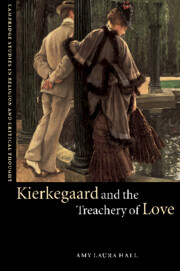Book contents
- Frontmatter
- Contents
- List of abbreviations
- Preface
- Introduction
- 1 The call to confession in Kierkegaard's Works of Love
- 2 Provoking the question: deceiving ourselves in Fear and Trembling
- 3 The poet, the vampire, and the girl in Repetition with Works of Love
- 4 The married man as master thief in Either/Or
- 5 Seclusion and disclosure in Stages on Life's Way
- 6 On the way
- Notes
- Works cited
- Index
2 - Provoking the question: deceiving ourselves in Fear and Trembling
Published online by Cambridge University Press: 22 September 2009
- Frontmatter
- Contents
- List of abbreviations
- Preface
- Introduction
- 1 The call to confession in Kierkegaard's Works of Love
- 2 Provoking the question: deceiving ourselves in Fear and Trembling
- 3 The poet, the vampire, and the girl in Repetition with Works of Love
- 4 The married man as master thief in Either/Or
- 5 Seclusion and disclosure in Stages on Life's Way
- 6 On the way
- Notes
- Works cited
- Index
Summary
I could easily write a whole book if I were to expound on the various misunderstandings, the awkward positions, the botched up movements I have encountered in just my own little experience.
(FT, 46)It takes no time at all to be deceived; one can be deceived immediately and remain so for a long time – but to become aware of the deception takes time … No earnest person, therefore, wearies of tracking down the illusions.
(WL, 124)INTRODUCTION
It may seem odd to read Fear and Trembling as related to Works of Love. In Works of Love, Kierkegaard describes God's command to love the other, while Johannes de Silentio, the character/narrator of Fear and Trembling, meditates on Abraham's absolute faith. There is an obvious Other in Fear and Trembling with whom the reader must grapple, but that Other is, most obviously, God. Indeed, it may appear at first glance as if de Silentio focuses solely on the individual's relationship to the Almighty. Yet Abraham is not alone with God on Mount Moriah. Isaac is there. And the very human other whom de Silentio can neither marry nor receive back with joy is significantly present in Fear and Trembling. Or, we should say, the girl's absence is saliently conspicuous, for the circumstance on which de Silentio bases his admiration and poetic description of Abraham is the girl's dismissal, or murder, or sacrifice.
- Type
- Chapter
- Information
- Kierkegaard and the Treachery of Love , pp. 51 - 82Publisher: Cambridge University PressPrint publication year: 2002

